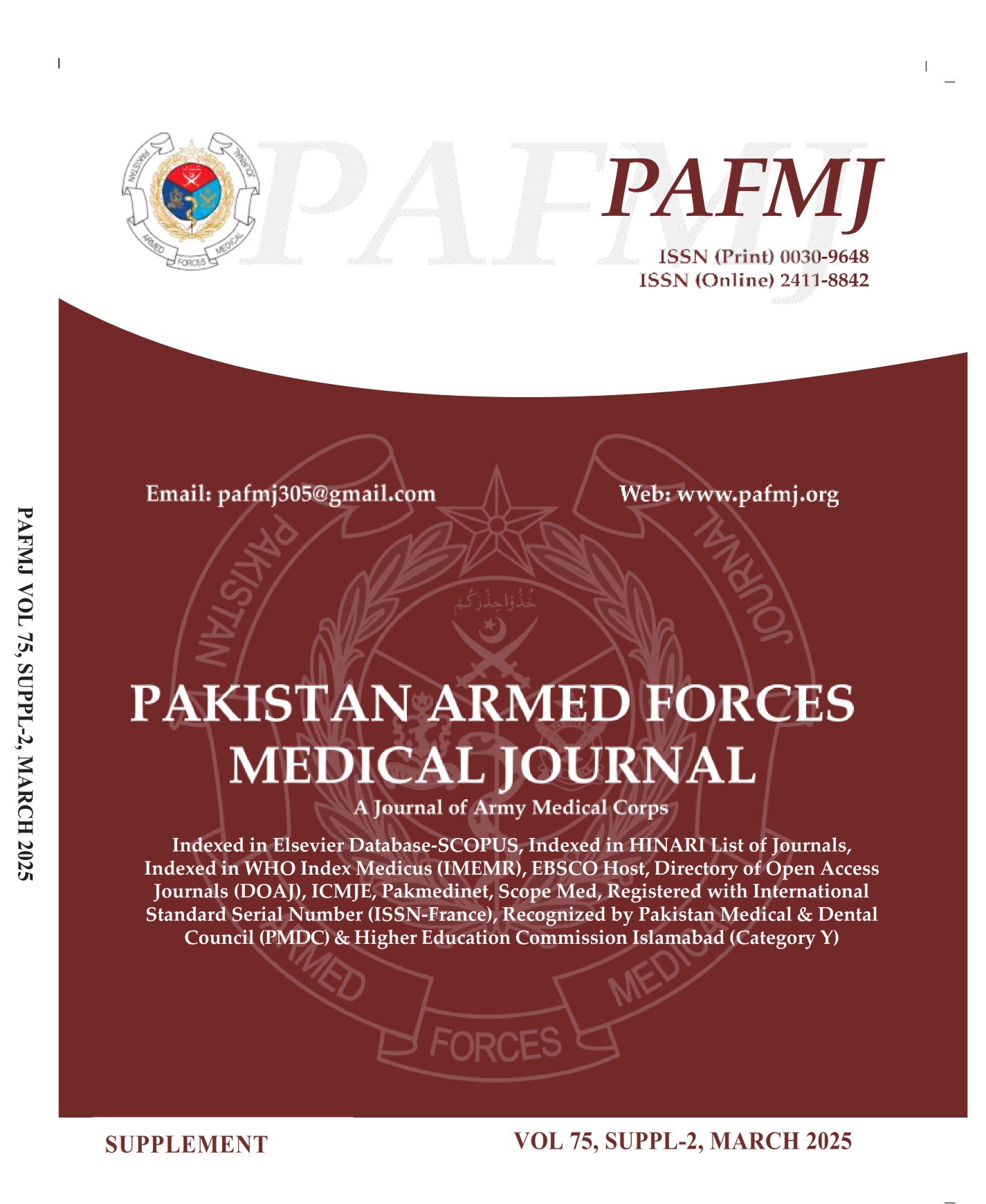Correlation Between Knowledge, Attitude and Practice towards Malaria in Khuzdar Garrison and Surrounding Areas: A Cross-Sectional Study
DOI:
https://doi.org/10.51253/pafmj.v75iSUPPL-2.6107Keywords:
Correlation, Malaria, Prevention.Abstract
Objective: To find correlation between knowledge, attitude and practice of malaria in troops and to identify any significant factors associated with them.
Study Design: Cross-sectional study.
Place and Duration of Study: Pathology department, Combined Military Hospital, Khuzdar Pakistan from Nov 2019-Oct 2020.
Methodology: Troops admitted with malaria, stationed in Khz Garrison and operational areas were included. Descriptive statistics were used for patients’ demographic profile and Mann-Whitney U-test was used for inferential statistics. Spearman’s rho correlation was used to find out correlation between study variables. The data were analyzed using SPSS 20.0.
Results: A total of 203 troops (all males) with confirmed diagnosis of malaria were enrolled. Age of participants ranged from 20-48 years, with a mean of 30.49+6.45years. Troops deployed in Khuzdar, operational areas and those returning from leave were 124(61.1%), 59(29.1%) and 20(9.9%) respectively. There was no significant correlation found between knowledge-attitude (r=-0.025, p=0.725), knowledge-practice (r=0.049, p=0.485) and attitude-practice (r=0.034, p=0.631). The mean attitude score (mean =31.5) of troops of services was higher than the mean score (median=29.5) of other arms. There was significant association of practice with respect to area of deployment with low practice in operational areas (p<0.001).
Conclusion: All troops had adequate knowledge about malaria. Troops of services’ arms had a better attitude towards malaria. Targeted interventions towards malaria prevention in operational areas should be enhanced.
Downloads
References
Saha A, Sarker M, Kabir M, Lu G, Muller O. Knowledge, attitudes, and practices regarding malaria control among the slash and burn cultivators in Rangamati Hill tracts of Bangladesh. Malar J 2019; 18(1): 216.
Ashley EA, Phyo AP, Woodrow CJ. Malaria. Lancet 2018; 391(10130): 1608-1621.
Munisi DZ, Nyundo AA, Mpondo BC. Knowledge, attitude and practice towards malaria among symptomatic patients attending Tumbi Referral Hospital: A cross-sectional study. PloS one 2019; 14(8): e0220501.
World Health Organization (WHO) . WHO recognizes national efforts towards Malaria elimination. In: Tanzania UR, editor. WHO Recognizes National Efforts Towards Malaria Elimination [Internet] WHO; Dar es Salaam: 2018. Available at:
https://afro.who.int/news/who-recognizes-national-efforts-towards-malaria-elimination
World Health Organization (WHO). WHO World Malaria Report2019. Available at:
https://www.who.int/malaria/publications/world-malaria-report-2019/en/
Pakistan Malaria Annual Report 2019. Available at:
Khan N, Sumbal A, Ara T. Malarial Prevalence in Balochistan Province, Pakistan(2002-2020).Int. J. Mosq. Res 2020; 7(3): 34-37.
Herekar F, Iftikhar S, Nazish A, Rehman S. Malaria and the climate in Karachi: An eight year review .Pak J Med Sci. Special Supplement ICON 2020 2020; 36(1): S33-S37.
Yasinzai MI, Kakar JK. Prevalence of human malaria infection in bordering areas of Balochistan with Sindh province: District Jaffarabad. J.Postgrad.Med.Inst 2012; 26(3): 277-282.
Armed Forces Health Surveillance Branch (Armed FH). Update: Malaria, US Armed Forces, 2017. MSMR. 2018 Feb; 25(2): 2.
Kish L. Sampling organizations and groups of unequal sizes. American sociological review.Am.Sociol.Rev 1965; 30(4): 564-572.
Cohen J: Statistical power analysis for the behavioral sciences. In. 2nd edition Edited by Hillsdale NJ. New Jersey: Lawrence Erlbaum; 1988.
Kebede DL, Hibstu DT, Birhanu BE, Bekele FB. Knowledge, attitude and practice towards malaria and associated factors in Areka Town, Southern Ethiopia: Community-Based Cross-Sectional Study. J Trop Dis 2017: 5(3): 240.
Medical Research Council Pakistan (2014). Malaria Indicator Survey in 38 High risk districts of Pakistan 2013–2014. Available from: https://dmc.gov.pk
Amusan VO, Umar YA, Vantsawa PA UYA. Knowledge, attitudes and practices on malaria prevention and control among private security guards within Kaduna. Science Journal of Public Health 2017; 5(3): 240-245.
Qayum M, Zahur H, Ahmad N, IIyas M, Khan A, Khan S. SPHERE-based assessment of knowledge and preventive measures related to malaria among the displaced population of Jalozai, Pakistan. J Pak Med Assoc 2012; 62(4): 344-346.
Maia MF, Kliner M, Richardson M, Lengeler C, Moore SJ. Mosquito repellants for malaria prevention (review). Cochrane Database Syst Rev 2018; 2(4): CD011595.
Saha KB, Sharma RK, Mishra R, Verma R, Tiwart BK, Singh N. Establishing communication mechanism for malaria prevention in Baiga tribal villages in Baiga Chak area of Dindori district, Madhya Pradesh. Indian J Med Res 2015; 141(5): 57683.
Bilal A, Siddiqui WA, Mansuri FA. Knowledge, Attitude and Practice (KAP) About Malaria Among Inhabitants of a Slum Area of Karachi. Annals Abbasi Shaheed Hosp. and Kar. Med. Dent. Coll 2013; 18(2): 79-85.
Aung PL, Pumpaibool T, Soe TN, Kyaw MP. Knowledge, attitude and practice levels regarding malaria among people living in the malaria endemic area of Myanmar. J.HealthRes 2019; 34(1): 12
Downloads
Published
Issue
Section
License
Copyright (c) 2023 Pakistan Armed Forces Medical Journal

This work is licensed under a Creative Commons Attribution-NonCommercial 4.0 International License.















